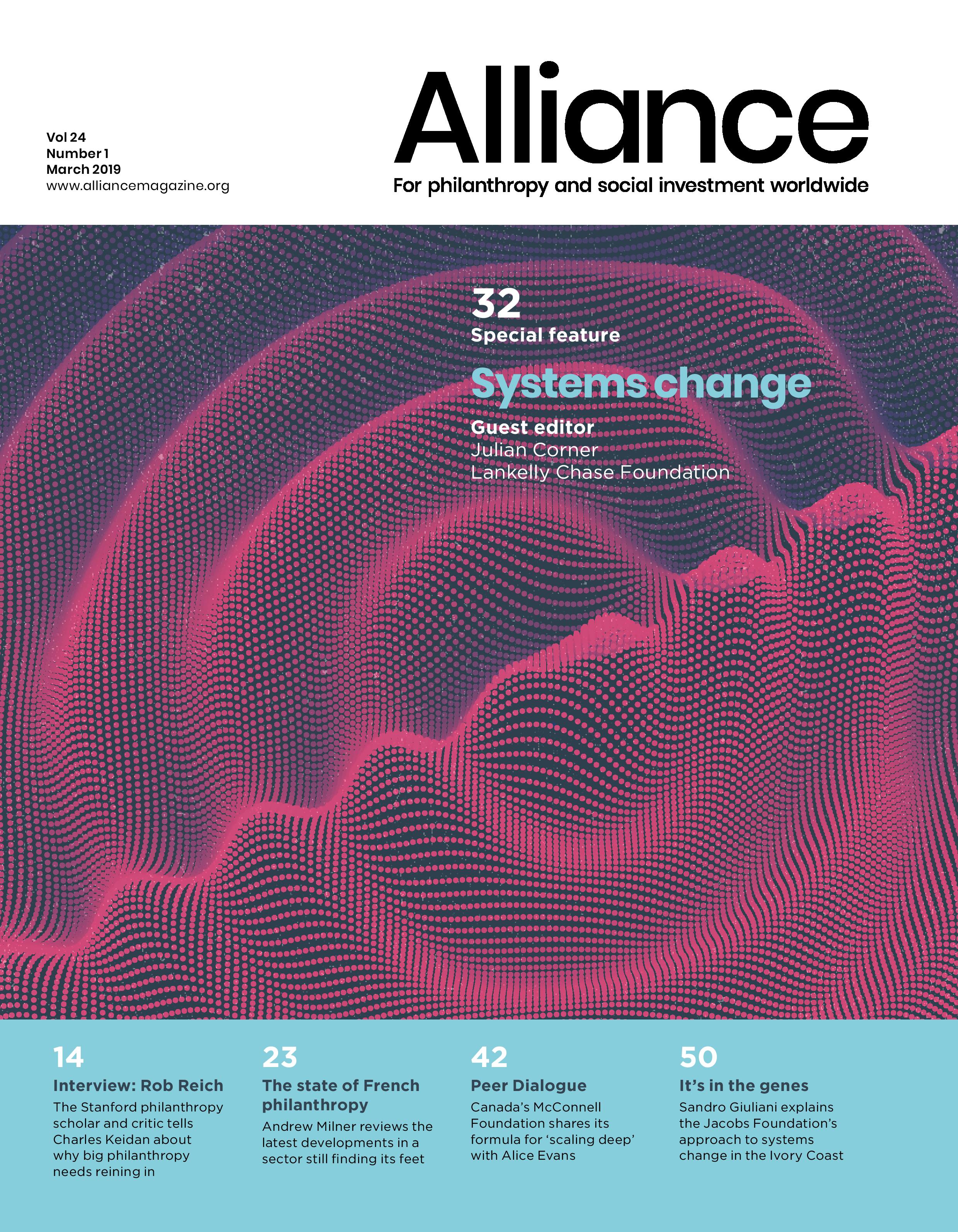It’s an auspicious moment for philanthropy in France but the sector is still finding its feet
In May, the European Foundation Centre will hold its annual conference in Paris and 2019 also marks the 50th anniversary of Fondation de France, founded with the support of Général de Gaulle to promote philanthropy in France. The sector has undergone prodigious growth since the turn of the century. It’s a bit like a baby giraffe, though – it’s grown quickly, but sometimes seems as if it hasn’t entirely found its feet. Traditional ambivalence towards philanthropy is still evident in France and the conservative stance of its foundations towards the most divisive issues of French society – the gilets jaunes protests are still fresh in the mind – raises questions about its role and purpose.
Dramatic growth in giving
One of the most notable trends, as almost all respondents to this article point out, is the rapid growth of the foundation sector. According to Fondation de France’s 2015 national survey (new data is expected later this year), in 2014 there were 2,229 foundations in France, with €21.9 billion in assets and total spending of around €7.4 billion a year. Their size is also increasing. Fifty foundations had assets of over €100 million in 2014, compared with 10 in 2001.
Several observers note that a change in the basis of the wealth tax (ISF) led to a real drop in gifts last year. Whether this is a blip on the chart or a longer-term trend is too early to say but it is putting increased pressure on an NGO sector already struggling for resources.
Individual giving has also risen. According to the Panorama national des générosités, altogether the French gave €7.5 billion in 2015, the biggest share of which came from tax deductible gifts under the impôt sur le revenu (IR). These rose by 70 per cent in the period 2006-15, reaching €2.62 billion. Crowdfunding is still small with only around 30 per cent going to philanthropy (the rest is loans and investments), though ‘the portion that goes to NPOs is really growing’ notes Laurence de Nervaux who oversees Fondation de France’s research arm, L’Observatoire de la philanthropie.
A big state
Probably the biggest single impetus for this growth is the encouragement provided by the government. There’s a curious irony here – the dominance of the French state has dictated both the previous limitations of the sector and assisted its recent growth. In a series of measures in the 1990s and more particularly in the early 2000s, the government introduced very considerable tax advantages for donors (France has probably the most favourable tax regime in Europe) and eased the conditions for setting up foundations.
The principal motive for this change is financial. As Jean-Jacques Goron of BNP Paribas Foundation succinctly puts it, ‘the government is favourable but, as with most governments, they are looking for money’.
‘There are too many types of legal status… the panorama of foundations in France is a nightmare.’ On the other hand, ‘it’s a weakness that we have too few large, forward-thinking foundations… that’s to say we have too few philanthropists’.
However, the generally positive picture needs some shading. Several observers note that a change in the basis of the wealth tax (ISF) led to a real drop in gifts last year. Whether this is a blip on the chart or a longer-term trend is too early to say but it is putting increased pressure on an NGO sector already struggling for resources. Karen Weisblatt, a Paris-based philanthropy consultant, notes that while the government is generally supportive of philanthropy ‘it’s struggling with seeing how it could be writ large’.
Moreover, French foundations remain relatively small. The largest, the Fondation Bettencourt Schueller, created by the heiress of L’Oréal, is about ‘equal in size to the 100th largest foundation in the US and that’s really an outlier in the French context,’ says Anne-Claire Pache, philanthropy chair at ESSEC Business School.
Marie-Stéphane Maradeix, executive director of the Fondation Daniel and Nina Carasso bears this out: ‘[Carasso] is supposed to be the second-largest family foundation in France, the first being Bettencourt… they are supposed to be giving around €50 million per year and my budget is only €15 million… this shows you that it is a tiny market.’
Maradeix also notes that ‘there are too many types of legal status… the panorama of foundations in France is a nightmare’. On the other hand, ‘it’s a weakness that we have too few large, forward-thinking foundations… that’s to say we have too few philanthropists’.
Corporate foundations
Corporate foundations are a key pillar of the French foundation sector. They play a prominent role according to consultant Judith Symonds, who teaches a course on philanthropy and civil society at Sciences Po. Symonds suggests that, ‘as of three years ago, corporate foundation giving was equal to private foundation giving… In the US, corporate giving is five per cent.’
Two possible reasons for this prominence are, according to Symonds, the Loi Aillagon, passed in 2003, which gave a great impetus to corporate philanthropy, and the development of a strong network body for the sector in Admical. Added to this is the fact that corporate foundations developed on the whole much earlier than private foundations. BNP Paribas Foundation, for instance, was set up in 1984.
Sheltered foundations
Another singular characteristic of the French foundation sector is the idea of the hosting foundation. Fondation de France is the oldest and probably the largest of these – it hosts 840 charitable funds and foundations, some of which are large. Fondation Carasso and BNP Paribas Foundation are among them. It’s a practice, says de Nervaux that is ‘developing in response to demand and growing interest’.
So what are the benefits of being hosted? Freedom in two senses, says Marie-Stéphane Maradeix. ‘We are completely free regarding our grantmaking and our investment policies and I am not burdened by administration.’ In addition, under the aegis of Fondation de France, governance arrangements are less restrictive than they are for an independent foundation. In the latter case, the family would have only a few board seats, ‘so if you want to have a real family project, like the Carasso Foundation is, it’s much better to have sheltered status than to be an independent foundation’.
New ways of working?
Maradeix believes that in her seven years’ experience with Carasso, foundations have begun to show signs of greater collaboration. Admical, for instance, set up a collaboration of corporate foundations on education a few years ago, ‘specifically to deal with educational drop-out. It started off as a working group and little by little they decided to pool funds to support a few, selected funds working in the area,’ she says.
Similarly, other French foundations are becoming more strategic, ‘trying to do much more capacity-building, convening, networking, that kind of thing’.
Safe causes
That said, most agreed that French foundations were inclined to focus on less controversial issues, ‘rather than on more difficult issues of rights or social division’, as Anne-Claire Pache puts it. Karen Weisblatt also notes that ‘NGOs countering hatred in racial or religious discourse have not been greatly supported here. Mostly, that’s because there is a desire among the foundation sector generally to work on areas that are consensual.’ She sees this in part as a result of the fact that there are ‘few large, independently endowed foundations’. The Observatoire’s statistics underline these views. In terms of areas of expenditure, by far the largest are health and medical research at 39.8 per cent and social welfare at 34.5 per cent. The next biggest issue area is higher education and initial training – at 5.3 per cent.
But respondents saw other reasons why French foundations tend to play safe. Paradoxically, one of them may be a law whose spirit is anti-discriminatory, as Marie-Stéphane Maradeix points out: ‘In France it is forbidden to collect statistics on religion and ethnic origin… so we cannot do anything in this area for want of data.’ However, she notes that after the Charlie Hebdo terrorist attack of 2015, a dozen or so foundations from different backgrounds created ‘the Fonds du 11 Janvier [11 January Fund, the date on which there were anti-terrorist demonstrations in Paris]. Out of that we began to fund projects dealing with racism, anti-semitism, etc, and we have funded many projects in schools.’
The growth of l’économie sociale et solidaire (ESS), organisations which seek to combine economic activity and social equity, has been both an impediment to the development of formal philanthropy, and an encouragement to philanthropic behaviour.
A second reason, notes Anne-Claire Pache, is that they are centralised. There are few foundations outside Paris, while the heartland of the recent gilets jaunes movement, for example, is really rural or semi-rural areas, ‘areas where private philanthropy is really not very active’, according to Pache.
A third reason for the relatively conservative areas of expenditure of French foundations, believes Judith Symonds, is the predominance of government influence – and what she sees as the consequent weakness of French civil society which limits the funding options of foundations. Social justice, for example, is seen as a domain of the government, so the social justice sector of civil society is limited.
The growth of the social economy
France’s strong tradition of mutualism is a double-edged sword when it comes to the development of French philanthropy. The growth of l’économie sociale et solidaire (ESS), organisations which seek to combine economic activity and social equity, has been both an impediment to the development of formal philanthropy, and an encouragement to philanthropic behaviour. Because of this tradition, notes Symonds, ‘they would rather invest, in my opinion, in entrepreneurial activities that have a social mission than be philanthropists’.
Karen Weisblatt, too, observes ‘a very active ESS sector’, which has benefited from government support. It is also drawing more public attention, especially among young people who see it as ‘a very attractive, third-way approach to engaging in professional life’.
An obstacle to growth here, says Laurence de Nervaux, is funding. ‘What is happening increasingly is that social enterprise models are no longer eligible for tax-deductible giving because they have some degree of profitability, even though many of them have a very high social added value.’ This is also something Fondation de France is working on and ‘on which we’re making recommendations to the fiscal administration so that they’ll change the way they interpret the criteria for eligibility for tax deduction’.
Impact investing
Opinions are mixed among respondents as to how much headway the use of investments, as against grants, has made in French philanthropy. Laurence de Nervaux called it ‘a growing concern and a developing practice’. Fondation Carasso itself is a case in point: ‘In 2015, we set up a small pot for impact investing – it was about three per cent or 13 million euros at that time,’ says Marie-Stéphane Maradeix, a figure which within the next five years will reach ‘15 per cent of our portfolio’. In spite of Carasso’s commitment, though, Maradeix is doubtful how much ground such approaches have gained generally. ‘Many of them talk about it, very few [foundations] are doing it,’ she notes. ‘One possible explanation is that there are very few grantmaking foundations with large endowments.’
Public perception
It’s also debatable whether public attitudes to philanthropy are changing. Maradeix thinks that ‘the public image of philanthropy in France is good’. Anne-Claire Pache also sees ‘more people speaking out about their philanthropic activities, some people even being prominent in the media, encouraging others to give’. The most notable of these is probably Alexandre Mars, a successful entrepreneur and founder of the Epic Foundation. Jean-Jacques Goron feels that ‘more comprehension is helping – letting people understand that what we are doing is really for the common good and this is not whitewashing or a mere public relations exercise’. In December 2018, two prominent business leaders launched a French version of the Giving Pledge, Changer par le don, encouraging rich people to give ten per cent of their assets to philanthropy.
‘Sector bodies are becoming much more activist towards the government than they were before because the foundation world is becoming a real sector. It’s not quite there, but it’s becoming stronger.’
But ambivalence about philanthropy remains. Mars has received his share of criticism. Interestingly, the two non-French respondents, Judith Symonds and Karen Weisblatt (both are Americans, based in France and having long experience of the philanthropy scene in both countries), were more cautious about the public perception of philanthropy. Symonds believes that the general attitude to philanthropy is ‘still pretty cynical. The view still is that the government should be providing support for social and environmental issues. The French feel they are paying their taxes for that and do not want to recognise the shrinking government resources.’ Weisblatt believes that ‘the public’s attitude towards philanthropy is not as positive as it might be’. She draws an interesting distinction: ‘I think people want to give, but giving is not seen as the same thing as philanthropy… I don’t think philanthropy as a field is well regarded, nor are the big foundations.’
France’s philanthropy infrastructure
For Laurence de Nervaux, the development of philanthropy infrastructure in France has proceeded in tandem with its professionalisation of the sector. Fondation de France, whose original purpose was the development of French philanthropy, has been instrumental in many of these developments. Having set up the Observatoire internally to produce data on giving and foundations, the need for external academic research was felt. In 2002, a chair in social enterprise and social entrepreneurship was created at ESSEC, followed by the creation of a philanthropy chair in 2011. Fondation de France was a founding partner of both. The philanthropy chair has co-funding from some large private foundations and a few individual donors. Anne-Claire Pache, who teaches one of the courses at ESSEC, stresses the significance of foundation support, as showing they are ‘taking responsibility to fund and support the production of… rigorous, independent, potentially critical research on the sector’. The courses and similar initiatives at Sciences Po and the one now being launched at Université Paris 8 are, she believes, ‘a sign that the sector is maturing’, adding, ‘it’s an additional way to put the sector on the map and in public discourse’.
Judith Symonds feels that ‘sector bodies are becoming much more activist towards the government than they were before because the foundation world is becoming a real sector. It’s not quite there, but it’s becoming stronger.’
Philanthropy need to address ‘all of the questions connected to diversity’, not least so that ‘foundations themselves look more like the populations they are serving… that would change the way philanthropy operates and would give it a better reputation’.
However, challenges remain. ‘There’s no equivalent of the [US] Foundation Center,’ says Karen Weisblatt. ‘There is not a single institution, one-stop shop where people can go to get up-to-date, easily accessible information about foundations themselves, who they fund, how they fund,’ she argues.
For Marie-Stéphane Maradeix, there are also ‘too many representative organisations. We should speak with one or two voices.’ Anne-Claire Pache agrees: ‘There’s one organisation promoting corporate philanthropy, Admical, then there’s Centre Français des Fonds et Fondations which promotes mainly foundations, there’s Fondation de France which has historically played a very active role and which is really the leading institution in that space – that’s already three different actors.’ She concedes that the diversity of voices has a positive dimension, since it helps to represent the breadth of opinion, but they don’t necessarily lobby in common. ‘More unity and more consensus on the way in which we could grow the sector could be more helpful,’ she believes.
The future
Will the present growth continue? Most respondents think so. ‘There’s a recognition that we need to find alternative resources for social causes,’ says Anne-Claire Pache, ‘so I would be quite optimistic that there is a general recognition that private philanthropy is needed alongside state contributions.’ She foresees that the current US debate over the challenges philanthropy poses for democracy will arise in France, especially given that inequality, as elsewhere, is a critical and very public issue. The gilets jaunes movement, she thinks, has highlighted the question of taxation paid by the wealthy and the responsibility of the rich towards society, ‘so the whole debate about taxation and philanthropy is likely to arise’.
In common with philanthropy elsewhere, Karen Weisblatt notes that the ability of French foundations to diversify their boards and staff may help its long-term legitimacy. Philanthropy need to address ‘all of the questions connected to diversity’, not least so that ‘foundations themselves look more like the populations they are serving… that would change the way philanthropy operates and would give it a better reputation’.
French philanthropy has come a long way in a short time. A rapidly expanding foundation sector, and increasingly sophisticated working practices and infrastructure, have been backed by favourable legislation. The general sense, though, is of a country still punching below its philanthropic weight. As Karen Weisblatt says, ‘there’s quite a long way to go’.
Andrew Milner is associate editor of Alliance.
Email: andrew@alliancemagazine.org
 Alliance wishes to thank Fondation de France for its sponsorship of this article to mark the Foundation’s 50th anniversary. All views expressed in this piece are the author’s alone.
Alliance wishes to thank Fondation de France for its sponsorship of this article to mark the Foundation’s 50th anniversary. All views expressed in this piece are the author’s alone.










Comments (2)
Mercy community schoolis located 75km south of lusaka in southern africa. The school is facing challenges of infrastructure and teachers allowances clothing the children. We have 750 orphans and vulnerable children. We dont have classrooms we are using a church building as classes. We are offering free education and counselling to street kid. Help as to advertise to frech organisations and individuals who can partner with as to help solving the problems the school is facing by building 5 classrooms, abolutions block, offices and clothing the children. We are looking forward to hearing from you soon
Hi Andrew. I am requesting to know if it will be possible for an international project to be fiscally sponsored by a France Non Profit organization or Foundation or any other that may help. You may also advice on the best option to follow to obtain funding from France. Any help you may Grant will be very much appreciated and at your earliest convenience time possible. Thanks.